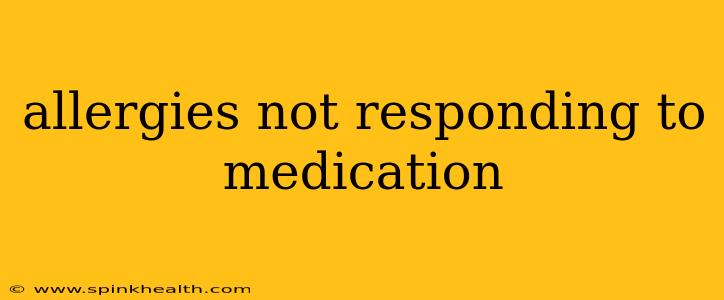Allergies. That dreaded itchy throat, sneezing fits, watery eyes – the unwelcome guests that crash the party of your daily life. And when your usual antihistamines or allergy medications just aren't cutting it, the frustration can be immense. It feels like you're fighting a losing battle, constantly bombarded by symptoms that refuse to relent. This isn't just inconvenient; it can significantly impact your quality of life, work productivity, and overall well-being. Let's delve into why your allergy medication might not be working as expected and explore some possible solutions.
My own experience with allergies started subtly. Initially, a few sneezes here and there, but it gradually escalated into a full-blown, debilitating onslaught. I tried over-the-counter antihistamines, nasal sprays, even prescription medications. Nothing seemed to provide lasting relief. The constant struggle made me realize how crucial it is to understand the root causes and seek effective solutions.
Why Isn't My Allergy Medication Working?
This is the million-dollar question, and unfortunately, there's no single easy answer. Several factors can contribute to medication ineffectiveness:
1. Incorrect Diagnosis or Mismatched Treatment:
Perhaps the most common culprit. Are you sure your symptoms are stemming from allergies? Sometimes, what seems like allergies might be a different condition entirely, like a viral infection or even something more serious. A proper diagnosis by an allergist is vital. They'll use skin prick tests, blood tests, or other methods to pinpoint your specific allergens and determine the most suitable treatment.
2. Dosage and Timing:
Are you taking the correct dosage at the right time? Some medications require consistent, daily use for optimal effectiveness. Taking a dose only when symptoms flare up might not be enough to prevent them.
3. Medication Interactions:
Certain medications can interfere with the effectiveness of allergy medications. Be sure to discuss all medications and supplements you're taking with your doctor or pharmacist. This includes over-the-counter remedies, prescription drugs, and even herbal supplements.
4. Allergen Exposure Levels:
The severity of your symptoms depends heavily on your exposure level to the allergen. If you're constantly bombarded with pollen, pet dander, or mold spores, your medication might simply be overwhelmed. Environmental control measures become critical in such cases.
5. Medication Resistance or Ineffectiveness:
In some cases, your body might have developed a tolerance to the medication, meaning it's no longer effective at controlling your symptoms. Or, your specific allergy might be resistant to certain types of treatment.
What to Do if Your Allergy Medication Isn't Working
If your usual allergy treatments aren't providing the relief you need, don't despair. There are steps you can take:
1. See an Allergist:
This is paramount. An allergist can perform comprehensive testing to identify your specific allergens and tailor a treatment plan that addresses your unique needs. This might involve different medications, immunotherapy (allergy shots), or other interventions.
2. Consider Different Types of Allergy Medications:
There's a wide range of medications available, including different types of antihistamines, decongestants, nasal corticosteroids, and leukotriene modifiers. Your doctor can help you determine which one is most appropriate for your condition and potential side effects.
3. Environmental Control Measures:
Minimizing your exposure to allergens is crucial. This might involve using air purifiers, regularly cleaning your home, washing bedding frequently, and avoiding triggers like pets or certain plants whenever possible.
4. Lifestyle Changes:
Simple lifestyle adjustments can sometimes significantly impact allergy symptoms. Maintaining a healthy lifestyle with regular exercise, a balanced diet, and adequate sleep can strengthen your immune system and improve your overall response to treatment.
5. Explore Alternative Therapies:
While not a replacement for medical treatment, some people find relief from alternative therapies such as acupuncture or herbal remedies. However, it's crucial to discuss these options with your doctor before trying them.
Are There Long-Term Solutions for Allergies?
Yes, there are long-term management options and even potential cures depending on the allergy type. Allergy shots (immunotherapy) can gradually desensitize your immune system to specific allergens over time, significantly reducing your symptoms. This is a longer-term commitment, but it can provide lasting relief for many individuals.
Your journey to managing allergies might involve trial and error. However, with the right diagnosis, tailored treatment plan, and proactive steps to minimize exposure, you can regain control and enjoy a life free from the relentless grip of allergy symptoms. Don't hesitate to seek professional help—your comfort and well-being are worth it.

